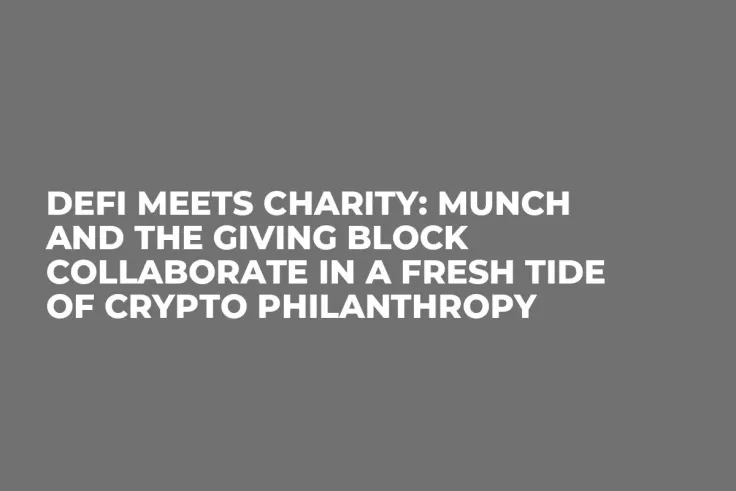
Munch, a fast-growing Decentralized Finance (DeFi) project has announced a recent collaboration with crypto-based charity organization, The Giving Block. This move targets greater impact in the crypto donations industry.
On June 10, Project Munch tweeted, ''We are ecstatic and extremely proud to join The Giving Block family. There is no limit to the amount of good we can do and lives we can impact together. #charity #nonprofit #cryptogiving''
The new collaboration links the growing community of The Giving Block, made up of nearly 200 nonprofits, with the automated donation tool of the Munch Protocol. It will also allow new nonprofits to receive Munch's donations directly when they create a profile on The Giving Block platform.
In the new wave of crypto philanthropy, it is assumed that if each cryptocurrency participant donates 1% of their assets to charities, given the current capitalization of the global cryptocurrency market, about $17 billion could be collectively raised.
While crypto donors have to make important decisions about how and where to give, the work begins further within the industry itself, which underscores the essence of the partnership.
Munch and The Giving Block Collaborate
In recent years, there has been a trend towards using cryptocurrencies for charitable purposes. Not only do many charities accept donations in bitcoin and other digital currencies, but new donation structures have emerged as well.
The history of cryptocurrency donations dates back to December 2017, when a man with the pseudonym “Pine” raised 5,057 bitcoins to donate in full to 60 charities.
Since then, cryptocurrency-based charities have become increasingly popular, reflecting the growing acceptance of digital assets. For example, The Giving Block, which is one of the largest platforms for crypto-friendly non-profit organizations, has made significant headway in promoting donations in Bitcoin (BTC), Ethereum (ETH), and other digital assets. In January, the platform teamed up with the American Cancer Society to create a new crypto cancer fund to raise at least $1 million. Fast forward to April, The Giving Block initiated the Crypto Giving Pledge to encourage more cryptocurrency donors to donate to over 200 non-profit organizations.
In addition to the rise in the number of charities based on cryptocurrency, crypto donors have become visible as against being anonymous. For example, Ethereum co-founder Vitalik Buterin and one of the youngest famous crypto billionaires in early May donated over $1 billion in cryptocurrency to the Covid India Relief Fund and several other charities.
Recent research also shows that the new generation of philanthropists strives for greater control over their donations and greater clarity about their impact. Blockchain-based donation systems offer efficient systems for both as they offer an immutable, secure, and publicly accessible transaction database available to anyone on the network.
The blockchain-based automated donation system backed by MUNCH, a Decentralized Finance (DeFi) project allows investors to donate and distribute a portion of their investments to charitable causes. Munch is also a community-driven project as it allows you to choose any charity you want.
Munch charges a 10% transaction fee on every purchase and sale made. This transaction fee is then divided into two parts: half is redistributed among other token holders, and half is converted to MUNCH. It then sends a percentage to donate in another, more stable token like Ethereum (ETH), which is then automatically donated to charity.
 Denys Serhiichuk
Denys Serhiichuk Alex Dovbnya
Alex Dovbnya Gamza Khanzadaev
Gamza Khanzadaev Tomiwabold Olajide
Tomiwabold Olajide